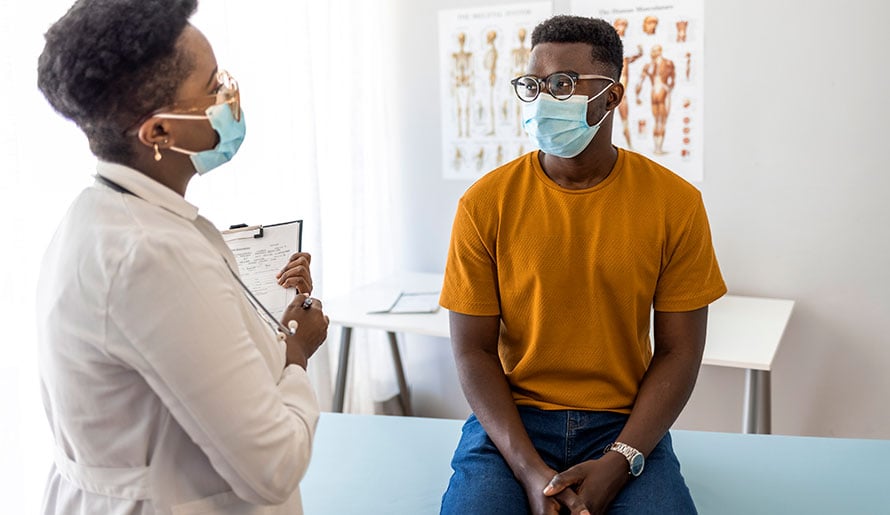Colon Cancer Signs and Symptoms

Colon cancer (colorectal cancer) is a malignancy that originates in the lower end of the digestive tract. Usually, the tumor begins as a small, benign growth (polyp) in the lining of the colon or rectum. Some—but not all—polyps progress into cancer over time.
Because identifying and removing polyps can help prevent colon cancer, many experts recommend periodic colonoscopies beginning around age 50 for people of average risk. A colonoscopy is a common screening test that allows a physician to examine the interior of the colon and rectum to find and remove polyps and other abnormal tissues.
Although colon cancer is one of the most frequently diagnosed cancers worldwide, it can often be detected and treated early, which can significantly improve the outcome.
Early warning signs of colon cancer
In many cases, there are no obvious signs of early-stage colon cancer. The first noticeable symptom may be a major change in bowel habits that lasts beyond a few days. One example is an increase in the frequency of solid bowel movements.
On the other hand, a brief change in bowel habits is more often a reaction to a certain food, caffeine or infection. If the change persists, however, it is best to err on the side of caution and talk with a physician.
Common symptoms of colon cancer
In addition to a major change in bowel habits, other symptoms of colon cancer can include:
- Bloody stools
- Persistent diarrhea or constipation
- Abdominal pain and bloating
- Unexplained weight loss
- New-onset iron-deficiency anemia

What does colon cancer feel like?
Sometimes, colon cancer produces a feeling that the bowel does not fully empty during bowel movements. Some people also experience abdominal discomfort, such as cramps and gas pain. Like many types of cancer, colon cancer can also cause overwhelming fatigue.
What does colon cancer look like?
Blood may be visible in the stools, on toilet paper or in the toilet bowl. Bloody stools may be bright red, black or tarry. Additionally, stools that are consistently narrower than usual may be an early sign of colon cancer.
Colon cancer vs. hemorrhoids
Hemorrhoids and colon cancer share some symptoms, including rectal bleeding and bloody stools. Compared to colon cancer, however, hemorrhoids are far more common and less serious. Similar to varicose veins that develop under the skin of the legs, these enlarged veins develop under the skin around the anus (external hemorrhoids) or inside the rectum (internal hemorrhoids). Because it can be difficult to distinguish between hemorrhoids and colon cancer, it is best to discuss the symptoms with a physician who can provide an accurate diagnosis and appropriate treatment if necessary.
Symptoms of advanced colon cancer
Late-stage or metastatic colon cancer may cause more pronounced and severe symptoms, such as:
- Intense abdominal pain
- Bowel obstruction
- Yellowing of the skin and whites of the eyes (jaundice)
- Liver enlargement (if the tumor has spread to the liver)
- Persistent coughing and shortness of breath (if the tumor has spread to the lungs)
- Headaches and seizures (if the tumor has spread to the brain)
Colon cancer symptoms in women vs. men
Some people believe colon cancer causes different symptoms in women and men, but that is not the case. The signs and symptoms are generally the same regardless of gender.
With that said, some studies suggest that men may be less aware of the signs of colon cancer and less likely to recognize a change in their bowel habits. Because early detection is critical to achieving the best possible outcome and quality of life, it is important for everyone—regardless of their gender—to pay close attention to their body and promptly discuss any concerning symptoms with a physician.
Frequently asked questions (FAQs) about colon cancer signs and symptoms
The following FAQs-related articles provide additional information about the signs and symptoms of colon cancer:
- Nine colon cancer symptoms you should not ignore
- Do colon polyps indicate colon cancer?
- How to tell the difference between hemorrhoids and colon cancer
- How long does it take for metastatic colon cancer to show symptoms?
Benefit from world-class care at Moffitt Cancer Center
The latest colon cancer screening methods, diagnostic services and treatment options are available through Moffitt’s renowned Gastrointestinal Oncology Program. If you would like to discuss your symptoms with a specialist on our team, you can request an appointment by calling 1-888-663-3488 or submitting a new patient registration form online. Moffitt has disrupted the traditional healthcare model to provide our patients with rapid care so they can begin treatment as soon as possible. No referral is necessary.
References
American Cancer Society: Do I Have Colorectal Cancer? Signs, Symptoms and Work-Up
BioMed Central: A Review of Sex-Related Differences in Colorectal Cancer Incidence, Screening Uptake, Routes to Diagnosis, Cancer Stage and Survival in the UK
